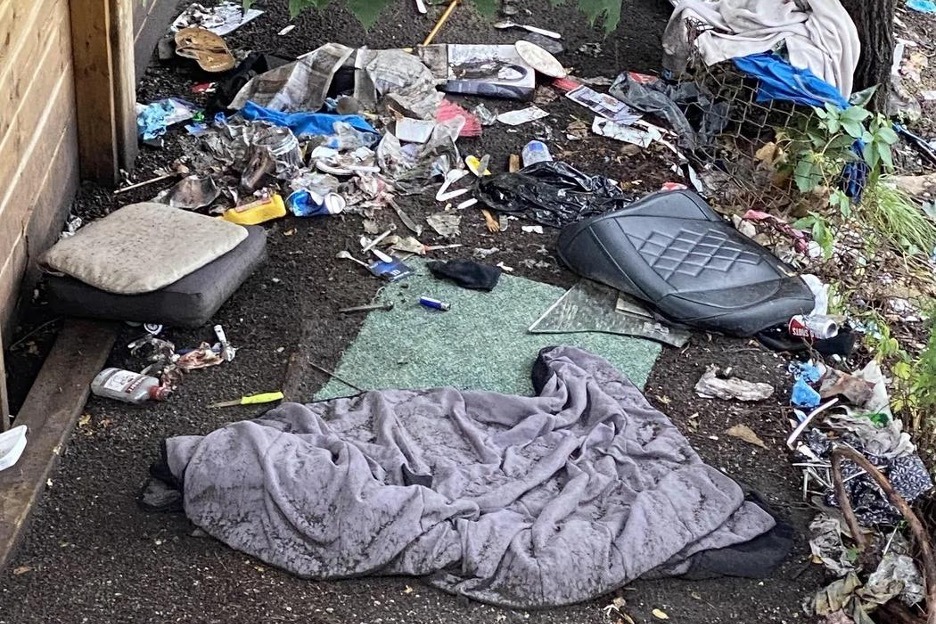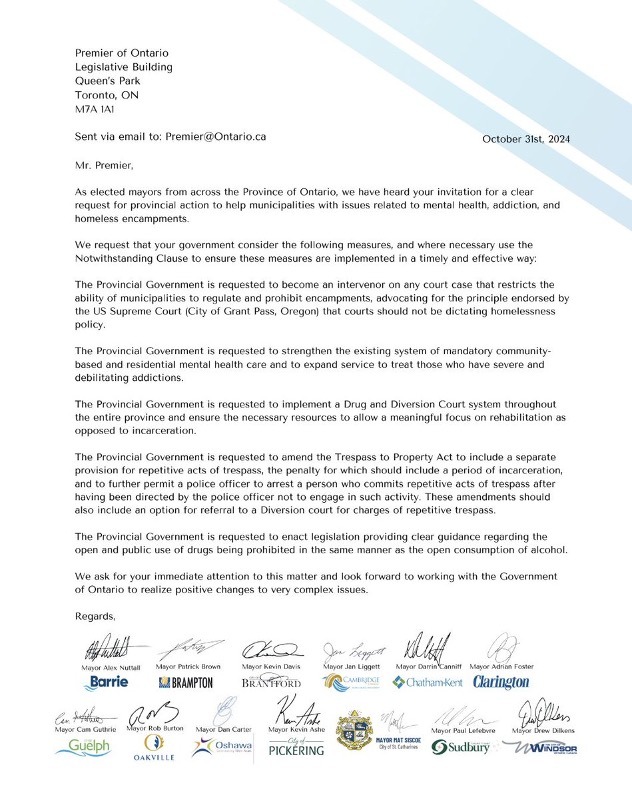Cambridge mayor’s call for notwithstanding clause sparks concern over homelessness and encampment policies

Mayor Jan Liggett of Cambridge is among a number of Ontario mayors calling on Premier Doug Ford to allow them greater capacity to address mental health, addiction, and homelessness in their municipalities.
In a letter shared on Oct. 31, 2024, 13 of Ontario’s Big City Mayors (OBCM) asked the Premier to invoke the notwithstanding clause to bypass Charter rights and clear homeless encampments. The mayors argued that court decisions restricting encampment clearances have hindered their ability to manage the growing homelessness crisis effectively.
The group cited a recent U.S. Supreme Court ruling in City of Grants Pass v. Johnson, which upheld the criminalization of sleeping outdoors, as a model for Ontario. In contrast, the Ontario Supreme Court’s January 2023 decision in the Region of Waterloo case prevented encampment evictions if the shelter system could not meet diverse needs, highlighting a significant legal barrier for local governments.
“What they’re actually asking for is to bypass court decisions that uphold the Charter rights of folks who are homeless,” said Diana Chan McNally, a Toronto-based community crisis worker. “This is an attempt to deprive an entire demographic of their right to life and existence because of the inconvenience it causes municipalities.”
The decision to send the letter was not unanimous among the OBCM. Waterloo mayor Dorothy McCabe, who did not sign the letter, expressed her concerns about the approach. “We need more funding for voluntary mental health and addiction services,” she stated. “Turning to involuntary treatment without addressing systemic gaps in voluntary care is counterproductive.”
The Solve the Crisis Campaign, initiated by the Ontario Big City Mayors earlier this year, had been advocating for increased provincial support to address homelessness, but with a focus on community-based solutions rather than legal crackdowns. The recent letter represents a potential shift toward a more punitive strategy, led by a minority of the coalition.
“It's a very small group of mostly men who are suggesting that the best way out of the housing crisis is to just make sure that homeless people have no charter rights,” said McNally. “They decided that they were the voice of Ontario.”

In addition to the notwithstanding clause, the mayors are calling for changes to the Trespass to Property Act. The proposed amendments include periods of incarceration for repeat offenses and enhanced police authority to arrest individuals who continue to trespass after warnings. The letter also asks for new legislation to restrict open drug use in public spaces, similar to existing laws against public alcohol consumption.
The proposed amendments come at a time when Premier Doug Ford has announced the closure of 10 safe injection sites by March 2025, replacing them with Homelessness and Addiction Recovery Treatment (HART) Hubs. These hubs will not offer supervised drug consumption or needle exchange programs, focusing instead on supportive housing and employment services.
Jeff Wilmer, co-founder of A Better Tent City, expressed concerns about the human impact of forced evictions. “People who are living rough need help, not to be moved along. Unless there’s a viable place for them to go, clearing encampments solves nothing,” he said.
Wilmer also noted the regional implications of the proposed actions. “It's more important than just having more shelter capacity. We need more supportive housing.”
In the Region of Waterloo, homelessness has been on the rise, with over 1,000 individuals experiencing homelessness as of the last Point-in-Time count. Despite significant investment in shelters and affordable housing by regional authorities, the demand continues to exceed available services.
The letter has sparked debate about the use of strong mayor powers and the broader responsibilities of municipal and regional governments to address homelessness. Mayor Liggett’s decision to sign the letter without consulting Cambridge City Council has raised questions about the democratic process behind such decisions.
Mayor McCabe highlighted the complex, multi-tiered governance structure in the Region of Waterloo, where responsibilities for social services like housing and homelessness management primarily lie with the regional government.
“We’re trying to work together, but the lack of adequate provincial funding and decision-making power creates significant gaps,” she said.
Post a comment